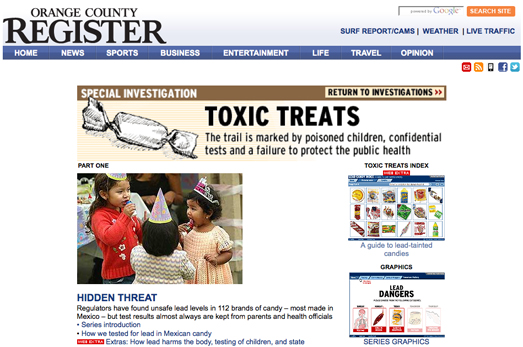 In 2012, Jenifer B. McKim, NF ’08, followed the trail of a federal investigation into a global child pornography network for The Boston Globe, where she is a business reporter. The winner of the 2011 Casey Medal for Meritorious Journalism for a story on domestic sex trafficking, she previously reported for The Orange County Register. Her series in that paper on lead-tainted imported candies was a finalist for the 2005 Pulitzer Prize for Public Service.
In 2012, Jenifer B. McKim, NF ’08, followed the trail of a federal investigation into a global child pornography network for The Boston Globe, where she is a business reporter. The winner of the 2011 Casey Medal for Meritorious Journalism for a story on domestic sex trafficking, she previously reported for The Orange County Register. Her series in that paper on lead-tainted imported candies was a finalist for the 2005 Pulitzer Prize for Public Service. This is the first in a series of Q. and A.'s with former Nieman Fellows about accountability reporting.
Dan Froomkin: Please discuss one or two of your favorite examples of successful watchdog journalism. What made each stand out to you?
Jenifer B. McKim: Boston Globe staff writer Sean Murphy recently wrote a story about the state highway safety director whose driving record included seven motor vehicle crashes, four speeding violations, and other infractions. At the time, she was on medical leave after crashing a state-owned vehicle. Days later, she resigned as news of her position sent a wave of embarrassment and consternation through layers of government about her hiring. It was a straightforward, outrageous story that wouldn’t have happened without an inquisitive journalist asking the right questions.
My all-time favorite example of watchdog journalism is The Boston Globe series about the priest sex scandal that had worldwide implications, with the Roman Catholic Church’s protection of workers over the safety of children. From state government to organized religion, we need journalists who hold organizations and people accountable.
What are some of your favorite sources for information and inspiration in this area?
Of course, I start reading dailies like The Boston Globe, The New York Times, and The Washington Post. I also am inspired by sites like ProPublica, Investigative Rerporters and Editors’s Extra Extra, and California Watch. One of my favorite journalists is New York Times columnist Nicholas D. Kristof, who specializes in the stories of exploited women and children and never tires of speaking in their defense.
What are the most important lessons you have learned during the course of your career that might be helpful to others pursuing watchdog journalism?
Never stop asking for public documents. Sometimes a simple public records request can lead to stunning discoveries. About 10 years ago I asked for records about lead poisoning in Orange County, California, not really knowing what I’d find. The answer–lead-tainted candies–prompted a two-year investigation into toxic treats eaten by immigrant children that led to new awareness of a growing public health threat, changes in state and federal laws to make it safer for children, and a finalist nod for the 2005 Pulitzer Prize for Public Service.

While working as a reporter for The Orange County (Calif.) Register, Jenifer B. McKim used public records to investigate lead-tainted candies that were poisoning children. Her stories prompted changes in state and federal laws.
I’ve also learned to be honest with all of my sources, especially those who are the targets of stories. People given a chance to respond, who know what to expect, are more likely to be helpful and less likely to sue. You’ll often be surprised at what they tell you. It’s also important to realize that not all stories are good versus evil; sometimes stories are murky and that’s OK too.
What is your biggest frustration about watchdog journalism? How can it be addressed?
My biggest frustration is not having the time to do it. With smaller and cash-strapped newsrooms, there is less time and opportunity to do this important work. Personally, I try to combat this by juggling several stories at once so I’m meeting the needs of the daily paper with shorter-term stories as I’m collecting string for more impactful, longer-term fare.
What can or should be changed about the culture of modern news organizations to encourage more watchdog journalism?
Every journalist who walks into a newsroom should be trained in the use and importance of public records. Journalists should be versed in public records laws and comfortable with public resources on their beats. I’m constantly mining public record sources like Accurint for information about sources; PACER for court documents, transcripts and bankruptcy information; as well as state registries of deeds for mortgage and foreclosure info.
What's one watchdog story anyone can do?
Anybody can write about the salary differentials of public officials on their beats. Just ask for them. In general, find out what’s publicly available on your beat and take a look.
Dan Froomkin writes about accountability journalism for Nieman Reports.


